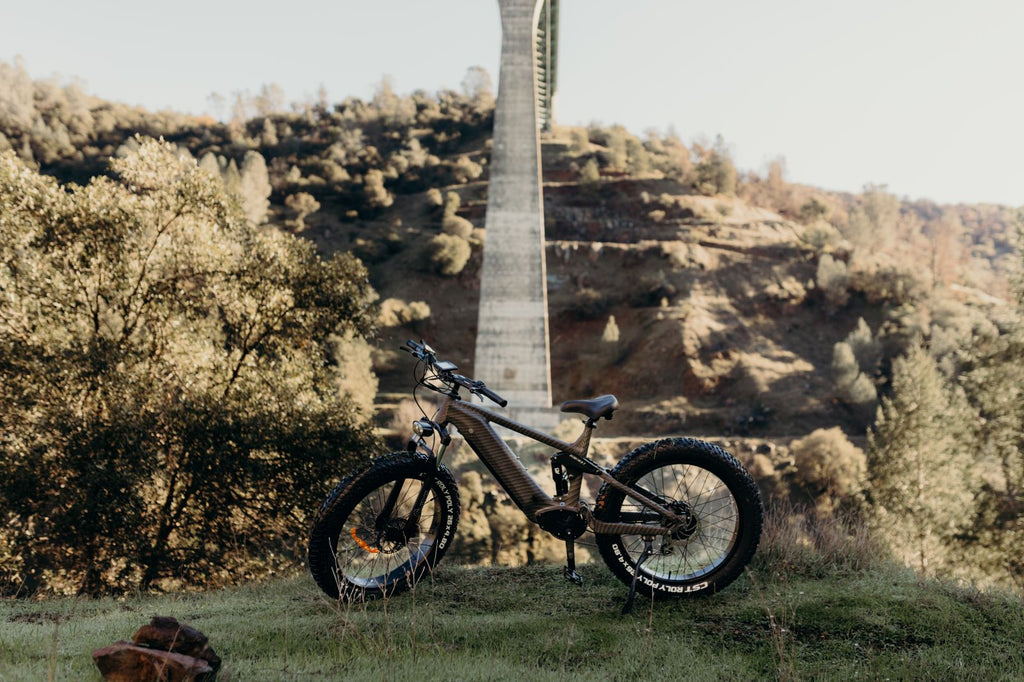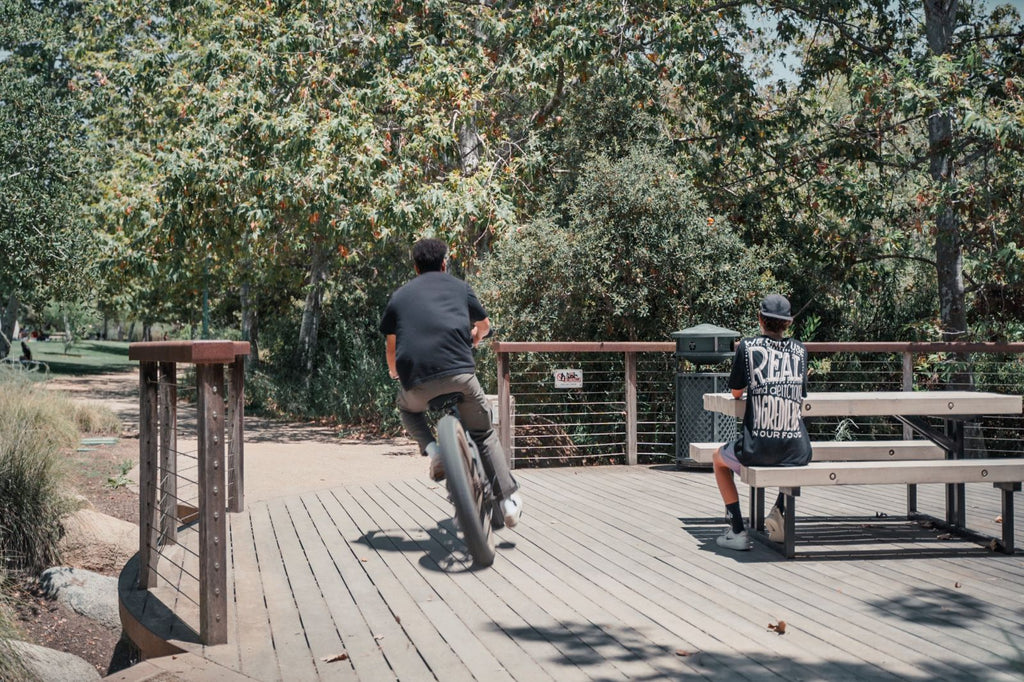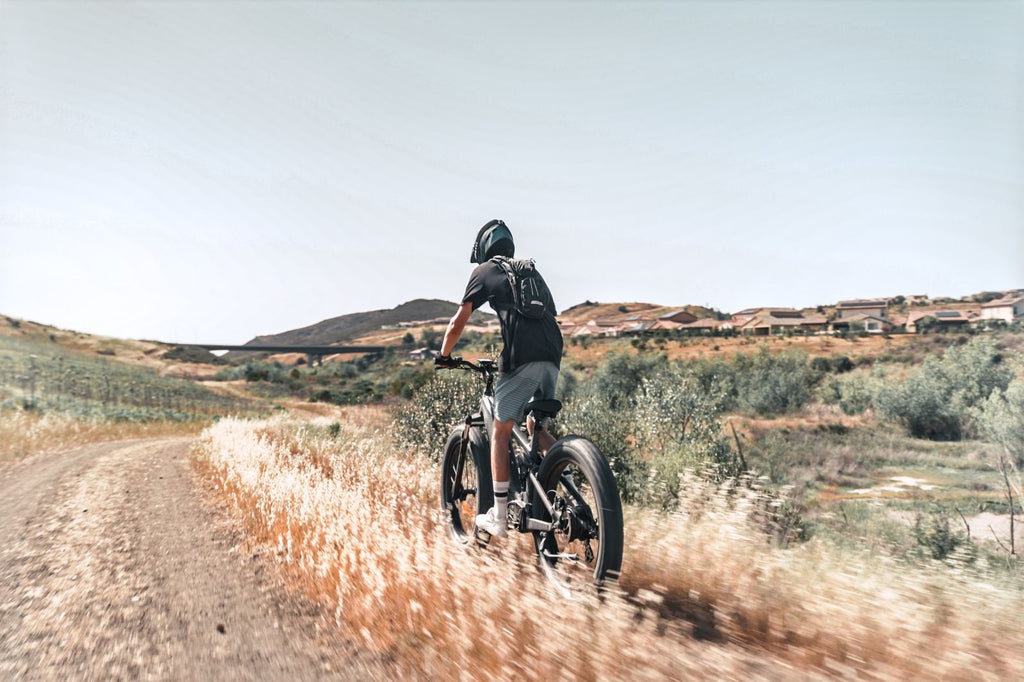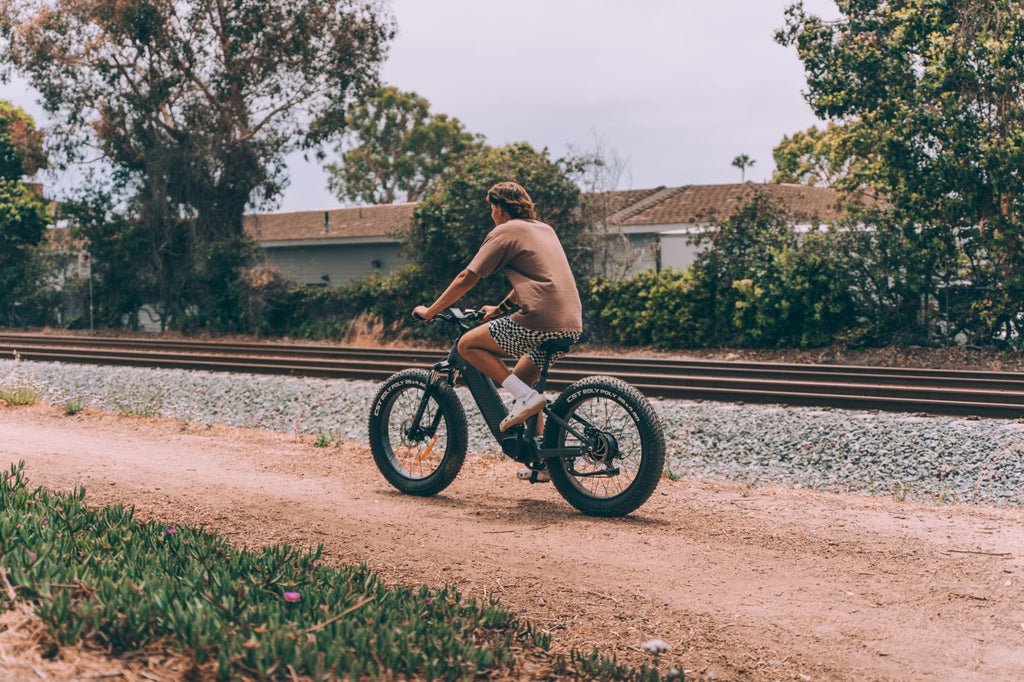Choosing between hardtail and softail e-bikes depends on your riding style and terrain. Hardtail e-bikes have front suspension only, offering lighter weight, lower cost, and efficient pedaling on smooth trails. Softail e-bikes feature lightweight rear compliance systems (flex stays or pivot designs) that provide some rear cushioning without full suspension weight. For maximum comfort on rough terrain, full suspension e-bikes have both front and rear shocks. Choose hardtail for budget-friendly trail riding, softail for balanced comfort, or full suspension for serious off-road adventures.
Quick Navigation
What Are Hardtail and Softail E-Bikes?
Understanding e-bike frame designs helps you choose the right bike for your riding needs. The three main suspension categories each serve different purposes.
Hardtail
Front suspension only. The rear stays rigid, connecting directly to the frame. Lighter, simpler, and more efficient for pedaling on smoother terrain.
Softail
Lightweight rear compliance. Uses flex stays, pivot points, or elastomer systems to provide subtle rear cushioning without full shock weight.
Full Suspension
Front + rear shocks. Complete dual suspension with adjustable rear shock absorbers for maximum comfort on rough, technical terrain.
Hardtail E-Bikes Explained
Hardtail frames feature a suspension fork at the front and a rigid rear end. The front fork absorbs bumps and vibrations from the road, while the solid rear triangle provides efficient power transfer. This design makes hardtails lighter and more responsive than dual-suspension bikes.
Hardtail e-bikes excel for riders who prioritize speed, efficiency, and simplicity. They're ideal for maintained trails, gravel paths, and urban commuting where extreme rear suspension isn't necessary. The rigid rear also means less energy loss during pedaling, extending your battery range.

Softail E-Bikes Explained
Softail frames sit between hardtails and full suspension bikes. Unlike motorcycles where "softail" refers to hidden rear shocks, bicycle softails use flexible rear stays, small pivot points, or elastomer cushioning to provide limited rear compliance. This gives you some bump absorption without the weight and complexity of full suspension.
The rear compliance in softail e-bikes typically offers 10-30mm of vertical flex or movement—enough to smooth out small bumps and vibrations but not enough for aggressive trail riding. This middle-ground design appeals to riders who want more comfort than a hardtail but don't need (or want to maintain) full suspension components.
Full Suspension E-Bikes Explained
Full suspension e-bikes feature both a front fork and a rear shock with 80-150mm+ of travel. The rear shock sits on a linkage system that allows the rear wheel to move independently, absorbing large impacts, roots, and rocks. This provides the most comfortable and controlled ride on technical terrain.
The trade-off? Full suspension bikes are heavier (typically 5-10 lbs more), more expensive, and require more maintenance than hardtails or softails. However, for serious off-road riding or riders with joint issues, the comfort and control gains are substantial.

How Do Hardtail and Softail E-Bikes Compare in Comfort and Handling?
Ride quality varies significantly across the three frame types. Your comfort priorities and riding style determine which design works best.
| Feature | Hardtail | Softail | Full Suspension |
|---|---|---|---|
| Comfort Level | Good on smooth terrain, harsh on rough trails | Better overall comfort, smooths small bumps | Excellent on all terrain, maximum cushioning |
| Handling | Nimble and responsive, quick steering | Balanced handling with slight rear compliance | Most stable, superior traction on rough terrain |
| Pedaling Efficiency | Highest - no rear suspension bob | High - minimal energy loss | Lower - some pedal bob unless locked out |
| Weight | Lightest (72-85 lbs) | Light-to-medium (75-88 lbs) | Heaviest (84-95+ lbs) |
| Maintenance | Simplest - just front fork service | Low - occasional flex stay inspection | Higher - front and rear shock service |
Ride Comfort Analysis
Hardtail e-bikes deliver a connected, responsive feel. You sense every trail feature, which some riders love for technical control. However, on rough terrain, the rigid rear transfers impacts directly to your body. Over extended rides, this can cause fatigue in your lower back, hands, and shoulders.
Softail e-bikes smooth out the smaller bumps and vibrations that cause fatigue, while maintaining most of a hardtail's efficiency. The limited rear compliance reduces jarring on gravel, washboard surfaces, and small roots without the weight penalty of full suspension.
Full suspension e-bikes provide the plushest ride. Both wheels absorb impacts independently, keeping your body isolated from trail chatter. This reduces fatigue dramatically on long rides and allows you to ride faster over rough terrain with better control.
Stability and Traction
Hardtails provide excellent stability on smooth surfaces. The rigid rear keeps the tire firmly planted during hard pedaling and cornering on maintained trails. However, on bumpy descents, the rear tire can bounce and lose traction momentarily.
Full suspension bikes maintain better tire contact on rough terrain. The rear shock keeps the wheel pressed to the ground over bumps, roots, and drops, providing superior traction and control. This makes them safer and faster on technical descents.
Softails split the difference—better than hardtails on moderately rough terrain, but not as capable as full suspension on extreme trails.

Which Terrain Works Best for Hardtail vs Softail E-Bikes?
Matching your bike to your typical riding terrain ensures the best performance and comfort.
Best Terrain for Hardtail E-Bikes
Hardtails excel on:
- Paved paths and bike lanes - Smooth surfaces let you maximize speed and range
- Groomed gravel trails - Well-maintained paths with minor bumps
- Fire roads and doubletrack - Wide, relatively smooth dirt roads
- Cross-country trails - Non-technical singletrack with minimal obstacles
- Urban commuting - City streets and sidewalks benefit from lightweight agility
Hardtails struggle on chunky rock gardens, root-filled trails, and steep technical descents where rear suspension provides crucial control and comfort.
Best Terrain for Softail E-Bikes
Softails handle:
- Mixed-surface riding - Transitions between pavement, gravel, and light trails
- Moderate gravel roads - Washboard surfaces and embedded rocks
- Touring and bikepacking - Long-distance rides on varied terrain
- Light trail riding - Non-aggressive singletrack with small obstacles
- Comfort commuting - Daily rides where some bump absorption matters
Softails provide the best balance for riders who encounter mixed terrain but don't need full suspension capability.
Best Terrain for Full Suspension E-Bikes
Full suspension bikes dominate:
- Technical mountain biking - Rocky, rooty, challenging trails
- Downhill riding - Steep descents with jumps and drops
- All-mountain adventures - Long rides on aggressive terrain
- Rough hunting trails - Unmaintained backcountry paths
- Extreme weather riding - Deep snow, mud, and loose surfaces
For riders tackling serious off-road terrain, the Himiway D5 2.0 delivers full suspension comfort with 100mm front and 130mm rear travel. Its dual suspension system absorbs the roughest trails while the 750W motor conquers steep climbs with ease.
Are Hardtail or Softail E-Bikes More Affordable to Maintain?
Initial cost and long-term maintenance vary significantly across frame types.
Purchase Price Comparison
Hardtail e-bikes typically cost $300-800 less than comparable full suspension models. Softail designs usually price between hardtails and full suspension, though true softails are less common than the other two categories.
For budget-conscious riders seeking maximum range and proven reliability, the Himiway D5 Zebra hardtail offers 60-80 miles of range with its 960Wh battery at an accessible price point. It's perfect for riders who want capable trail performance without full suspension costs.
Maintenance Requirements
Hardtail maintenance focuses on the front fork. Annual fork service (oil change and seal inspection) costs $75-150 at bike shops. Many riders handle this themselves with basic tools. The rigid rear frame requires no specialized maintenance beyond normal bike care.
Softail maintenance depends on the specific design. Flex-stay systems need periodic inspection for cracks or fatigue but rarely require service. Pivot-based softails may need occasional bearing checks. Overall maintenance remains closer to hardtails than full suspension.
Full suspension maintenance requires servicing both front and rear shocks. Professional service runs $150-300 annually for both shocks, or more for premium components. Rear linkage bearings also need periodic inspection and replacement. Budget an extra $200-400 per year compared to hardtails.
Durability Considerations
Hardtails last longest with minimal service. The simple design has fewer wear points. Full suspension bikes experience more stress on pivot bearings and shock seals, requiring more frequent part replacement. Softails sit in the middle—more durable than full suspension, with slightly more complexity than hardtails.
All Himiway e-bikes include a 2-year warranty covering electrical components and frames, plus UL 2849 and UL 2271 certifications for safety. This protection applies whether you choose hardtail, softail, or full suspension models.

Frequently Asked Questions
What's the main difference between hardtail and softail e-bikes?
Hardtail e-bikes have front suspension only with a completely rigid rear frame. Softail e-bikes add limited rear compliance through flexible stays or small pivot systems, providing some rear cushioning without full suspension weight. The difference affects comfort, weight, and cost—hardtails are lighter and cheaper, while softails offer better bump absorption with minimal weight penalty.
Are softail and full suspension the same thing?
No. Softail e-bikes use flex stays or limited pivot movement (10-30mm compliance) for subtle rear cushioning. Full suspension e-bikes have dedicated rear shock absorbers with 80-150mm+ of travel. Full suspension provides far more comfort and control on rough terrain but weighs significantly more and costs more to maintain. Softails bridge the gap between hardtails and full suspension.
Do hardtail e-bikes cause back or kidney problems?
Hardtails transmit more vibration to your body than suspended designs, which can cause fatigue on rough terrain. However, they don't inherently cause injury. Proper bike fit, good riding posture, quality saddles, and appropriate tire pressure minimize discomfort. For riders with existing back issues or arthritis, softail or full suspension bikes provide better long-term comfort. Learn more in our electric bikes for arthritis guide.
Can I upgrade a hardtail e-bike to full suspension later?
No. The frame itself determines suspension type. Hardtail frames lack the pivot points, linkages, and shock mounts required for rear suspension. Converting a hardtail to full suspension would require replacing the entire frame, which isn't cost-effective. If you anticipate needing full suspension, purchase a full suspension e-bike from the start or consider a softail as a compromise.
Which lasts longer: hardtail or softail e-bikes?
Hardtails typically last longer with less maintenance. The rigid rear frame has no pivot bearings to wear out or rear shock seals to service. Softails last nearly as long, with occasional flex stay inspection needed. Full suspension bikes require the most maintenance—rear shock rebuilds, linkage bearing replacement, and pivot bushing service every 1-3 years. With proper care, all three types can last 10+ years.
Is a hardtail e-bike good enough for beginners?
Yes, hardtails are excellent for beginners. They're lighter (easier to handle), simpler to maintain, and more affordable. The rigid rear helps you develop better riding technique since you learn to pick smooth lines and position your body correctly. Beginners riding primarily on pavement, gravel, or smooth trails will find hardtails perfectly capable. The Himiway D3 Cruiser is ideal for first-time e-bike buyers with 916+ verified reviews.
Why do some riders prefer hardtail despite the rougher ride?
Experienced riders choose hardtails for several reasons: lighter weight for easier transport and climbing, lower maintenance costs, better pedaling efficiency (no suspension bob), and the direct trail feedback that helps develop technical skills. Cross-country racers favor hardtails for their speed advantage on smoother courses. Budget-conscious riders appreciate the lower cost. The "rougher ride" is only significant on technical terrain—on maintained trails, hardtails feel fast and responsive.
Can softail or full suspension e-bikes handle jumps and drops?
Full suspension e-bikes handle jumps and drops excellently—the rear shock absorbs landing impact and maintains traction. Softail bikes can handle small jumps and drops (under 1-2 feet) depending on frame design, but they're not built for aggressive jumping. Their limited rear travel won't absorb large impacts safely. For serious off-road riding with jumps, choose a full suspension model like the Himiway D7 Pro with 220mm front and 190mm rear travel.
Do I need full suspension for mountain biking, or is hardtail enough?
It depends on trail difficulty. Cross-country trails with moderate obstacles work fine on hardtails—many riders prefer them for the lighter weight and efficiency. Technical trails with rocks, roots, drops, and steep descents demand full suspension for safety and control. Softails work for light-to-moderate mountain biking but won't handle advanced trails. Evaluate your local terrain: if trails are smooth to moderate, hardtail is enough. If they're technical or you plan to progress to harder trails, invest in full suspension.
Which frame type is best for seniors or riders with joint pain?
Full suspension e-bikes provide the most comfort for seniors and riders with arthritis or joint pain. The dual suspension isolates your body from trail vibrations and impacts, reducing stress on joints, back, and hands. Softails offer a middle ground with some cushioning benefit. Hardtails work for seniors riding primarily on smooth pavement but aren't ideal for those with existing pain. Pair any suspension type with a step-through frame for easier mounting. See our complete electric bikes for seniors guide for more recommendations.
How Do You Choose the Right E-Bike Frame for Your Needs?
Selecting the ideal frame type comes down to four key factors: your primary riding terrain, comfort priorities, budget, and maintenance willingness.
Choose a hardtail e-bike if:
- You ride primarily on paved paths, groomed trails, or light gravel
- You want the lightest possible e-bike for easier transport
- Budget is a priority and you want to maximize value
- You prefer minimal maintenance and simple mechanics
- You value efficient pedaling and maximum battery range
Choose a softail e-bike if:
- You ride mixed terrain (pavement, gravel, light trails)
- You want more comfort than a hardtail without full suspension weight
- You're touring or bikepacking on varied surfaces
- You want low maintenance but appreciate some rear compliance
- You ride moderate trails but don't need aggressive suspension
Choose a full suspension e-bike if:
- You tackle technical mountain bike trails regularly
- Maximum comfort is your top priority (seniors, joint issues)
- You ride rough terrain like hunting trails or backcountry paths
- You're willing to invest in higher purchase cost and maintenance
- You want the best traction and control on challenging descents
For riders who want the ultimate in comfort and capability, the Himiway D5 2.0 full suspension e-bike combines 100mm front and 130mm rear travel with switchable torque/cadence sensors and Maxxis Minion tires. It's built for serious all-terrain riding while maintaining excellent pedaling efficiency.
Budget-conscious riders seeking proven reliability and long range should consider the Himiway D5 Zebra hardtail, featuring a massive 960Wh battery for 60-80 mile range at an accessible price point.
Find Your Perfect E-Bike Frame
Explore Himiway's complete range of hardtail and full suspension e-bikes designed for every riding style and terrain.
Shop All E-Bikes














































